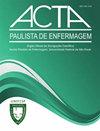The newly graduated nurse as a second victim
IF 1
4区 医学
Q3 NURSING
引用次数: 0
Abstract
Objective To describe the prevalence of newly graduated nurses as second victims of adverse events and to know the conditions of support received in health institutions. Methods Cross-sectional, descriptive, quantitative study. The population consisted of newly graduated nurses who agreed to answer the online questionnaire with questions related to being hired at the institution, involvement in adverse events and management of the second victim condition. Contacted was by email, intermediated by the Regional Nursing Council of São Paulo. Descriptive data analysis and the test of equality of proportions were performed. Results The final sample consisted of 138 nurses, 54.3% were unaware of the term ‘second victim’, 44.9% were unaware of the existence of institutional protocols for emotional support to professionals and 26.8% were involved in adverse events. Of these, 94.6% presented emotional distress, frustration, guilt, sadness, stress, inability, embarrassment and insecurity to perform their duties at work as an outcome of the event; 59.5% received some type of support and 21.6% received institutional punishment. Conclusion The prevalence of newly graduated nurses involved in adverse events was 26.8%, and among those who experienced this incident, the majority presented negative feelings and insecurity in performing their work as an outcome. After the event, most of the time, the support received came from work colleagues and significant others. Regarding institutional support, the need for programs for emotional support is also highlighted, so that these professionals can overcome when finding themselves in the place of the second victim.第二个受害者是刚毕业的护士
目的了解新毕业护士作为不良事件第二受害者的流行情况,了解卫生机构对新毕业护士的支持情况。方法横断面、描述性、定量研究。研究对象包括刚毕业的护士,他们同意回答在线调查问卷,其中的问题与在该机构的招聘、不良事件的参与和对第二受害者状况的管理有关。联系是通过电子邮件进行的,中介是圣保罗地区护理委员会。进行描述性资料分析和比例相等检验。结果138名护士中,54.3%的人不知道“第二受害者”一词,44.9%的人不知道存在专业人员情感支持的机构协议,26.8%的人参与不良事件。其中,94.6%的人在事件发生后表现出情绪困扰、沮丧、内疚、悲伤、压力、无能、尴尬和不安全,无法履行工作职责;59.5%的人得到了某种形式的支持,21.6%的人受到了机构处罚。结论新毕业护士发生不良事件的发生率为26.8%,其中以对工作表现出消极情绪和不安全感为主。事件发生后,大多数时候,得到的支持来自同事和重要的人。关于机构支持,也强调了对情感支持项目的需求,以便这些专业人员在发现自己处于第二个受害者的位置时能够克服。
本文章由计算机程序翻译,如有差异,请以英文原文为准。
求助全文
约1分钟内获得全文
求助全文
来源期刊

Acta Paulista De Enfermagem
NURSING-
CiteScore
1.40
自引率
0.00%
发文量
92
审稿时长
4 weeks
期刊介绍:
Acta Paulista de Enfermagem – (Acta Paul Enferm.), ISSN 1982-0194, is a [bilingual] technical-scientific electronic publication of the Escola Paulista de Enfermagem – EPE, Universidade Federal de São Paulo – UNIFESP.
Our mission: To disseminate the scientific knowledge generated within the rigor of research and ethics methodology.
Our objective: To publish results of original research for advancement of practices of clinical, surgical, and management nursing, as well as education, research, and information and communication technology.
 求助内容:
求助内容: 应助结果提醒方式:
应助结果提醒方式:


